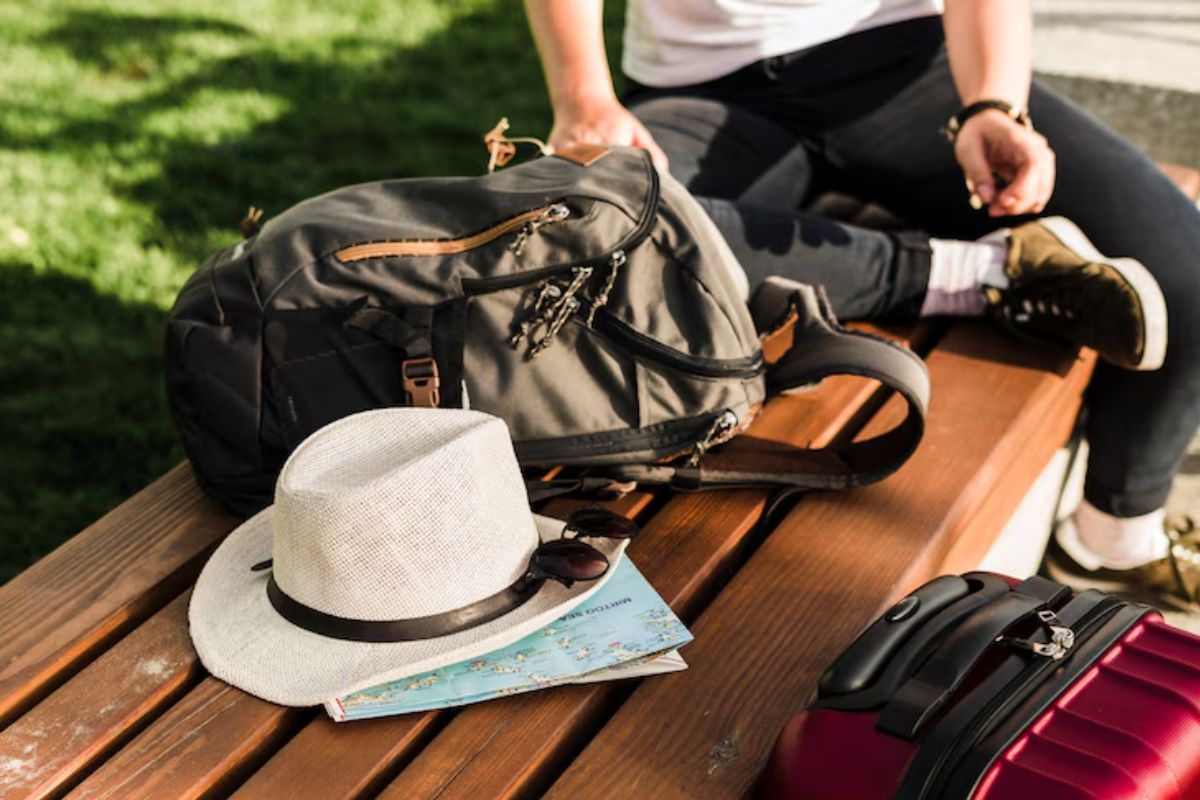Travel Hacks for Long-Term Backpackers

Tracking your spending and planning ahead are essential for long-term travel. Keep a daily log or app-based budget tracker (e.g. TravelSpend or Goodbudget) to record all expenses. Review a few weeks of spending at home to set a realistic budget. Use travel credit cards wisely – many cards (with no foreign transaction fees) let you earn points for free flights or hotel nights. Bring multiple payment methods (backup credit/debit cards, cash in a safe place) and notify banks of travel to avoid frozen cards. Always carry a small emergency stash of cash hidden in your pack.
Sign up for loyalty and reward programs: airline and hotel points can add up to significant savings. Book flights with fare-comparison tools like Skyscanner (a free global flight search). For accommodation, compare Hostelworld dorm beds vs. budget hotels – sometimes longer hostel stays unlock discounts, and sites like Airbnb often offer 30–60% off monthly rates. Finally, never travel without insurance. A good travel insurance policy (e.g. SafetyWing or World Nomads) covers illness, theft, or trip cancellations. As one long-term traveler notes: “Travel insurance will protect you… I never go on a trip without it”.
Efficient Packing Strategies & Essential Gear
Pack light and versatile. A one-bag strategy is ideal: limit yourself to ~7 days’ worth of clothes. As one seasoned traveler advises, “pack one week’s worth of clothing… you’ll just do laundry once a week”. Choose a capsule wardrobe of mix-and-match tops and bottoms, and use quick-dry fabrics. Layer wisely: e.g. instead of bulky sweaters, pack one packable down jacket and thermal layers to adapt to cold climates. Limit footwear to 2–3 pairs (hiking shoes, casual walking shoes, maybe sandals): “bring no more than three pairs, opting for shoes that match all your clothing”. Remember comfort (your feet will thank you on long hikes or city walks) and versatility (dress shoes can often double as night-out footwear).
Stay organized with packing aids. Use lightweight packing cubes or compression sacks to group outfits and squeeze out air. Roll clothes to save space and reduce wrinkles. Fill dead space (inside shoes, jacket pockets) with socks or electronics. Make a checklist of essentials: toiletries (biodegradable soap, toothbrush, minimal cosmetics), a lightweight microfiber towel, and a small travel laundry kit. Include a basic first-aid kit (bandages, pain relievers, any prescriptions) and sun/insect protection (sunscreen, bug spray) – these are invaluable on the road. For hygiene, pack pocket-size hand sanitizer and alcohol wipes: unscented sanitizer and biodegradable soap keep germs at bay when tap water is questionable. Moist towelettes and a bandana can serve as quick washcloths. Also pack a universal adapter (for multiple plug types) and a spare power bank to keep devices charged during long travel days.
Affordable Accommodation and Lodging Hacks
Budget travelers have many alternatives beyond hotels. Consider hostels, which offer cheap dorm beds and social connections, but also look into free or work-exchange stays. Websites like TrustedHousesitters, MindMyHouse or Nomador match travelers to house-sitting gigs – you get a free home (often with pets) in exchange for minor chores. As one expert notes, “House-sitting (usually free) … the places you stay can be pretty glamorous”. Couchsurfing (or WarmShowers for cyclists) lets you stay with locals at no cost – but always be respectful and perhaps offer a small gift or meal in thanks. Long-term rentals or homestays can be cheaper when booked off Airbnb (try local Facebook groups or forums to find furnished sublets). Another traveler points out that longer stays earn deeper discounts: “we tend to stay for a month or longer and take advantage of monthly pricing… discounts often run between 40–60%”.
For free stays, volunteer work exchanges are golden. Sites like Worldpackers, HelpX, and Workaway connect you with farms, hostels, and eco-projects where you work 20–30 hours per week for room and board. For example, one blogger lists work-exchange opportunities from milking goats in Hawaii to teaching English in Spain. These not only save money but immerse you in local life. Always vet programs carefully and read reviews, as arrangements vary widely.
Finally, be flexible: travel in off-season, negotiate longer-stay rates (many guesthouses or family-run inns will lower the price if you stay a week+), and consider camping when safe (even basic campsites or glamping can cost much less than hotels). In some places, rural homestays or community lodges offer low-cost rooms and the chance for cultural exchange. By mixing and matching these options, long-term travelers often cut accommodation expenses dramatically.
Image: A backpacker enjoys a free stay (e.g. house-sitting or Couchsurfing), illustrating creative lodging options like house-sitting or work-exchange.
Health, Hygiene & Safety Tips
Staying well is key to sustaining long trips. Pre-trip medical prep: visit a travel clinic months ahead of departure. Update routine vaccines (MMR, DPT, flu, etc.) and get destination-specific shots (typhoid, hepatitis A/B, yellow fever, etc.) as advised by professionals. Carry an International Certificate of Vaccination (the “yellow card”) if visiting countries requiring proof of inoculations (some require yellow fever vaccine). Bring a basic first aid kit: include bandages, antiseptic wipes, OTC meds (painkillers, anti-diarrheal, antihistamine), and any prescription medicines you need. One travel nurse recommends packing “Band-Aids, small scissors, and OTC medications like Tylenol… handy to have on hand no matter where you are”.
On the road, practice strict hygiene. Wash hands frequently or use alcohol-based sanitizer – a simple habit that cuts GI illnesses drastically. If tap water isn’t safe, use water purification: carry a refillable bottle with a filter (e.g. LifeStraw or SteriPEN). This saves money and plastic bottles. When eating street or local food, ensure it’s thoroughly cooked and piping hot to avoid food poisoning. Peeling fruit yourself is safer than pre-cut. Consider a short-term vitamin supplement and stay hydrated.
For safety, secure your valuables. Use luggage locks and anti-theft gear, and consider a portable travel safe (Master Lock travel safe) to stash passports, cash or devices in hostels. Always carry photocopies of your passport/visa and a digital backup (e.g. scanned to cloud or email). Check passport expiration: many countries (and the Schengen Zone) require validity 6+ months past your travel date. Register with your embassy for alerts if possible. Stay aware of local laws and customs; avoid risky areas, especially at night. Trust your instincts in uncomfortable situations.
Lastly, manage common travel ailments: carry diarrhea medication (bismuth subsalicylate or loperamide), and if visiting malaria zones, take anti-malarial pills or prophylaxis as prescribed. Apply insect repellent (DEET) and sleep under mosquito netting where needed. Balance work and rest: long travel can be stressful, so schedule down-time, eat nutritious foods when you can, and get enough sleep to keep immune function strong.
Visa and Travel Documentation Strategies
Plan your paperwork well in advance. Check visa requirements early: many countries require that your passport has at least six months’ validity beyond your entry date. If you’ll be in visa-exempt regions (e.g. Europe’s Schengen Zone allows 90 days in any 180-day period for US/Canadian visitors), note the limits—after 90 days you must leave or apply for a long-stay visa. Some countries now use electronic travel authorizations (e.g. ETIAS for Europe, ETA for the UK), so complete those online before travel. Always research each country’s specific rules (embassy websites or travel.state.gov) and carry necessary documents (e.g. yellow fever certificate where required).
Make copies and backups: before departure, scan or photograph your passport, visas, driver’s license, travel insurance, and itinerary. Keep one set of copies on your phone/cloud and a paper copy in a separate part of your luggage. Leave copies with a trusted friend or family member at home. In case of loss or theft, having duplicates and emergency contact info speeds up getting replacements. Bring extra passport photos and keep emergency cash in hidden stashes. If you’ll be driving abroad, remember an International Driving Permit (IDP) is required in many countries.
Stay on top of expiration dates: smartphone travel apps (like Passport.app or even calendar reminders) can alert you to renew a passport or apply for a new visa before it becomes critical. For multi-country trips, work out an itinerary that respects visa lengths (visa runs or overland circuits can reset your status when needed). If you hold dual citizenship, carry both passports to optimize visa-free access. Always enter and exit each country on the same passport to avoid confusion. By preparing documents carefully and backing them up, you’ll avoid common hassles and keep your trip on track.
Essential Digital Tools & Apps
Today’s travelers rely on a few indispensable apps. Offline navigation: Download map apps like Maps.me (excellent offline maps with detailed walking paths) as a complement to Google Maps. Carry a portable charger for your phone. Translation: Google Translate (with offline languages) lets you scan menus or have quick voice chats – it’s “one of the most essential apps for international travel”. For phrasebook backup, try a lightweight dictionary app or even Duolingo for basics.
Planning and booking: Use Skyscanner to find cheap flights worldwide. Hostelworld and Booking.com cover budget stays; Airbnb or local homestay sites can be better for month-long rentals. Organize your itinerary with TripIt or Google Trips – simply forward confirmation emails and it auto-builds your schedule. For buses or trains, Rome2Rio is great for planning door-to-door routes (it shows plane, train, bus and driving options on one map).
Money and communication: Use mobile banking apps like Revolut, Wise, or Monzo to hold multiple currencies and get good exchange rates. Splitwise helps track shared expenses with friends. Get a local or eSIM data plan (apps like Nomad sell global eSIMs) so you have data for maps and contacting locals. On Wi-Fi networks, use a VPN (e.g. PIA or NordVPN) to secure your connection and access any services blocked in-country.
Staying connected: Messaging apps like WhatsApp, Telegram, or Signal are essential for free international calls and texts. Save emergency contacts, embassy info, and travel forums to your favorites. For inspiration and information, offline-reader apps (Pocket) or multi-language guidebooks (like Lonely Planet ebooks) can be lifesavers when Wi-Fi is scarce.
By equipping your phone with these tools, you turn it into a travel multi-tool – helping with navigation, bookings, budgeting, and even meeting people (Couchsurfing’s app, Meetup, or local Facebook groups) – so you can focus on the adventure, not logistics.
Image: A traveler’s smartphone (with maps and booking apps) – essential for navigation, translation, and planning on the go.
Sustainable and Culturally Respectful Travel
Aim to leave a positive impact. Travel slowly and use public transit whenever safe; every local bus instead of a taxi or flight helps cut carbon. Reduce waste: carry a reusable water bottle and refill it (or use a filtered bottle) to avoid plastic bottles. Carry a small reusable shopping bag and cutlery – even these little things add up. Follow the “leave no trace” rule on hikes and beaches: if there’s no trash bin, pack your garbage out. One long-term traveler advises: “No one wants to hike with garbage… If there are no bins, take it with you”.
Support local communities. Eat at family-run cafés or street stalls rather than international chains; buy souvenirs from artisans, not tourist-trap shops. This helps ensure your tourist dollars benefit the people who live there. Sustainable tourism experts stress that travel should “contribute positively to the local economy” – e.g. paying fair wages to guides and choosing locally owned guesthouses. When booking tours or activities, opt for operators with eco-friendly and ethical practices (no animal exploitation, transparent fees, etc.).






